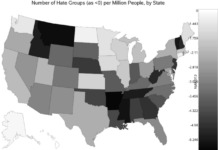Earlier this month, Kansas secretary of state Kris Kobach, the operating head of the Presidential Advisory Commission on Election Integrity, asked all state election officials to provide detailed data on registered voters– Social Security numbers, party affiliations, military statuses, criminal histories, voting records, the lot.
Kobach quickly had a bipartisan revolt on his hands. At last count, 26 states will only release what is considered public record–which, with almost no exceptions, will fall far short of Kobach’s demand. Another 19 states, plus the District of Columbia, won’t comply at all.
One of the states that is refusing to send any data to Kobach is crimson-red Mississippi, where Donald Trump won 57-40. When its Republican secretary of state, Delbert Hosemann, got wind of Kobach’s letter, he publicly and loudly told Kobach where he could go with that letter and how he could get there.
@DelbertHosemann's Statement on Request for Voter Roll Information: https://t.co/ucxlN4lfkA pic.twitter.com/nISxZIeexU
— Mississippi SOS (@MississippiSOS) June 30, 2017
On the surface, it looks like a principled stand by a Republican elected official who took off his red-tinted blinders. But it turns out that Hosemann has been sending data to a Kobach-run “voter fraud” project for almost a decade–a project that is almost as problematic as Kobach’s current enterprise.
Mississippi Today, a nonprofit newsroom dedicated to covering events in the state, discovered that in 2009, Hosemann began sending voter data to the Interstate Voter Registration Crosscheck Program, a project run out of the Kansas Secretary of State’s office. Its stated purpose is to flag instances of people being registered in more than one state, as well as “double votes.” As of 2016, 28 states took part in the project.
Hosemann said that there are big differences between Crosscheck and the Advisory Commission’s program. While Hosemann’s office shares birthdates, addresses, and the last four digits of Social Security numbers with Crosscheck, he said that data is under state control, “with no permanent centralized database.” It is governed by a “confidentiality agreement” among the participating states. Additionally, the shared data is subject to “strict security standards, including encryption and permanent deletion.” In contrast, Hosemann criticized the Advisory Commission’s regimen for not including a “guarantee of confidentiality,” as well as the lack of state oversight.
That’s all good and well, but Crosscheck isn’t much of an improvement over the Advisory Commission’s planned database. In a revealing piece for Rolling Stone last summer, veteran investigative journalist Greg Palast discovered that Crosscheck disproportionately flags young and minority voters–major cogs in the Democratic voting coalition. Database expert Mark Swedlund reviewed Crosscheck data obtained by Palast, and found that minorities were heavily overrepresented in 85 of the 100 most common last names flagged by Crosscheck’s matching process. Swedlund concluded that, whether intentionally or not, Crosscheck is “discriminatory against minorities.”
Part of the problem is Crosscheck’s methodology. Many of the names on Crosscheck lists aren’t matched by middle name, and in many cases flag fathers and sons as being the same voter if they happen to share the same first and last name–ignoring “Jr.,” “Sr.,” etc. In Georgia, for instance, James Willie Brown is considered to be the same person as James Arthur Brown. Swedlund found that if you’re named Joseph Garcia or Jose Garcia, “you’re probably suspected of voting in 27 states.” Several states have actually pulled out of Crosscheck because its methodology is so shoddy–something that could not, or should not, have gone unnoticed by Hosemann.
Before his clash with Kobach, Hosemann first made a name for himself in 2014 when he refused to let True the Vote, a tea-infused vote-monitoring group, obtain the birthdates of Republican primary voters after longtime Senator Thad Cochran fended off a stiff challenge from state senator and tea partier Chris McDaniel. A federal judge sided with Hosemann and refused to let a suit by True the Vote go forward. At the time, Hosemann trumpeted it as a victory for Mississippians’ privacy. But as it turns out, at the same time he was sending data to a program that was almost as troubling.
Granted, Mississippi has turned an unrecognizable shade of red at nearly every level since the turn of the millennium, and was an automatic deposit in Republican presidential candidates’ accounts long before then. But you would think that regardless of that, Hosemann would want to do everything possible to ensure that the integrity of our elections is protected. And that doesn’t just include doing so for the cameras. It includes ensuring that voters’ rights aren’t endangered by programs like Crosscheck that are only marginally less monstrous than what Kobach is trying to do now.
(featured image courtesy Hosemann’s Facebook)





